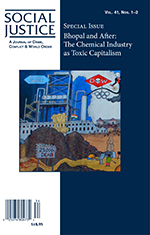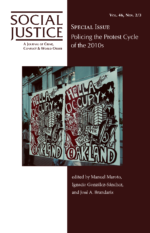Description
Thirty years after the Bhopal tragedy, this issue revisits the meaning of the disaster, its causes, and its consequences. The first section deals with the aftermath of the catastrophe, examining the struggle over the memory and memorialization of Bhopal and the lamentable failure of the medical and legal professions and systems to provide relief and justice to the survivors. The second section examines an example of toxic capital in action in northeast England, the failures of international regulation of chemical hazards, and the chemical warfare attack on Halabja in Kurdistan. The final section looks at resistance to the depredations of toxic capital, beginning with the movement for justice in Bhopal, while also considering recent struggles in India.
TABLE OF CONTENTS
I. Bhopal
Remembering Bhopal: Voices of Survivors
Rama Lakshmi and Shalini Sharma
“Just like any other city”: The De-Gasification of the Bhopal Gas Relief System
Bridget Hanna
Criminal Failure and “The Chilling Effect”: A Short History of the Bhopal Criminal Prosecutions
Tim Edwards
II. Toxic Capital
Toxic Capital Everywhere: Mapping the Co-Ordinates of Regulatory Tolerance
Steve Tombs and David Whyte
Controlling Chemical Hazards: Global Governance, National Regulation?
Tomás Mac Sheoin
Chemicals for War and Chemicals for Peace: Poison Gas in Bhopal, India and Halabja, Kurdistan, Iraq
Indra Sinha
III. Resistance
Indian Media and the Struggle for Justice in Bhopal
Shalini Sharma
“All the World’s a Stage”: The Bhopal Movement’s Transnational Organizing Strategies at the 2012 Olympic Games
Bridget Botelho and Stephen Zavestoski
Transnational Anti-Corporate Campaigns
Tomás Mac Sheoin
Challenging Toxic Hegemony: Repression and Resistance in Rossport and the Niger Delta
Laurence Cox
Bhopal and Struggle for Social Justice in India
Madhuresh Kumar
BOOK REVIEWS
Toxics in China
Emily Hill
Saro-Wiwa Letters
Pauline Conroy





Reviews
There are no reviews yet.